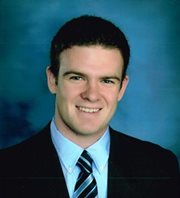Christopher Reynolds

Chris is a medical student and Dean’s Scholar at the University of Michigan Medical School, where he is pursuing a career centered around infectious diseases, emergency health, and implementation science in global public health. Prior to medical school, Chris earned a Fulbright research grant to study the healthcare barriers of reincorporating Revolutionary Armed Forces of Colombia (FARC) ex-combatants in urban and rural areas of Colombia, and the perceptions of healthcare providers caring for them. He has also studied HPV prevalence and knowledge among men who have sex with men in Liberia, and adolescent health in Ecuador, Peru, the Dominican Republic, and the U.S. Southern border. Chris holds degrees in Biochemistry and Theology from Boston College, where he was a Gabelli Presidential Scholar. Outside of school he enjoys all things in nature and the outdoors, traveling and salsa dancing. He said it is an honor to receive the 2020 Kean Fellowship from the American Society of Tropical Medicine and Hygiene.

Effectiveness of a community text-messaging triage system to reduce hospital treatment delay of obstetric sepsis in rural areas of Bong County, Liberia
Bong County Ministry of Health
Liberia
What does the Kean Fellowship mean to you?
The Kean Fellowship is a huge honor. I have been privileged to have participated in many global health projects in the past where health disparities are pervasive, including among collaborators in Monrovia, Liberia. The Kean Fellowship now affords the unique opportunity to understand how to collaborate on an implementation-science based project, where our team can work to address inequities in care access. I am excited for our project, which is designed to address a common health disparity I have witnessed across multiple settings: pre-hospital delay times and care access difficulties due to distance. Though our project is designed to address hospital delay and referral times through mobile technology, piloting this project with trusted partners could lead to opportunities for scalability, application in other settings, or introducing other technology-based programs. I also consider myself lucky to be part of such an accomplished group of young professionals. Learning about the other Kean Fellows, and witnessing the extensive contributions they have made to global health and tropical medicine despite being so early in their careers, is remarkable.
What do you anticipate learning?
In the past, I have been frustrated by global health research which only goes as far to identify problems without implementing solutions to address them. Of course accurately identifying problems is crucial, but too often these identified problems go unaddressed and community partners engaged in the research can become understandably disillusioned. The exciting piece to our project is that we will be studying a long-term intervention, designed to lower maternal mortality rates through decreased hospital and pre-hospital referral delays. I hope to learn from this project how to effectively pilot an intervention that through the process of its implementation not only proves to be a successful model with potential for scalability, but works to improve health outcomes of those participating in the research. I am also hopeful to witness the newly emerging challenges for the communities I work with in Liberia. The country has changed drastically since I was last there in 2017. Liberia is a post-conflict state which less than a decade into peace dealt with a devastating Ebola outbreak, and now faces new threats of re-emerging conflict and COVID-19. Despite these challenges, young Liberians are emerging as leaders, optimistic to create change in their communities. I am hopeful that I can learn from these leaders how to best collaborate with and support their efforts to improve healthcare delivery.
What interests you about tropical medicine and what problems are you interested in solving?
Tropical medicine is a guarantee to work with vulnerable and often ostracized communities. Those who get most sick are too often the individuals living on the margins of society, who also lack care because of dangerous, oppressive, and often unidentifiable structures. I believe we are all called to follow our vocation to create a more just world through the impact we leave on others, and there are still many strides to be made in tropical medicine related to equal partnership, community empowerment, and implementing innovative solutions. My first area of interest in tropical medicine is living out the dynamic of equal partnership, which too often is not done. It is sensible and easy to agree with the theory behind equal partnership, but difficult to live out in practice. Second, the medical community still has not figured out how to leverage the amazing technologies of this century to be most effective in low-resource settings, where citizens are living in level 1 and 2 poverty. An exciting piece to this project for my own interest is determining how to implement an accessible technology in partnership with the community.